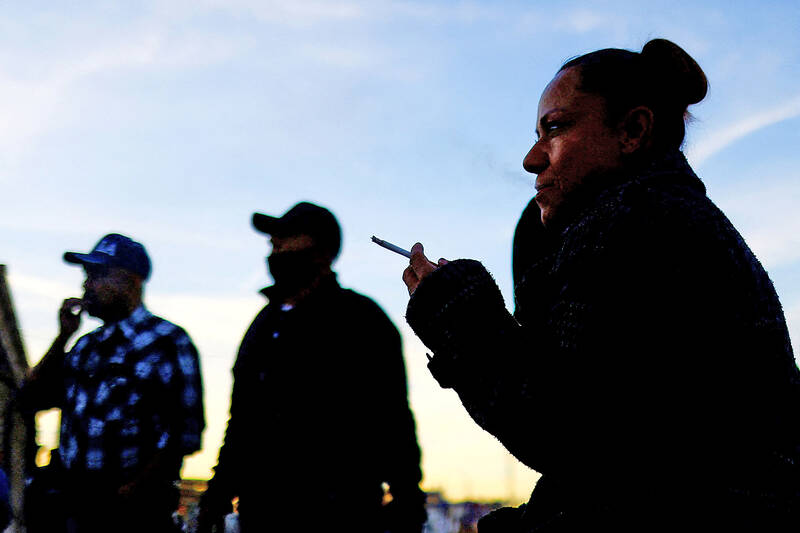Stopping smoking at any age helps to reduce the risk of cancer, according to a major study, which found the most substantial drop in cancer risk came after the first decade of stubbing out.
The chances of developing cancer halved in people who quit for at least 15 years, compared with those who continued to smoke, with the risk from lung cancer falling further and faster, particularly in those who quit before middle age.
Researchers analyzed medical data from nearly 3 million Koreans who had health examinations from 2002 onwards and recorded cases of cancer, including lung, liver, stomach and colorectal tumors until 2019. Over the course of the study, nearly 200,000 participants received a cancer diagnosis.

Photo: Reuters
“Regardless of age, quitting smoking has been shown to reduce the risk of developing cancer, especially lung cancer, with early cessation before middle age leading to significant reductions,” said
Oh Jin-kyoung, who led the study at the National Cancer Center near Seoul.
After an average follow-up of 13 years and five months, the risk of lung cancer among quitters fell 42 percent, with smaller falls of 27 percent, 20 percent and 14 percent recorded for liver, colorectal and stomach cancers respectively, compared with those who continued smoking. Details were published in Jama Network Open.

Photo: Reuters
Cancer causes more than a quarter of all deaths in the UK each year, with lung cancer by far the most common. Smoking causes at least 15 different cancers, affecting the lungs, bladder, stomach and bowels and organs, such as the kidneys and liver. Tobacco is the largest preventable cause of cancer and death in the country.
According to the study, smokers who quit before the age of 50 had their risk of lung cancer fall 57 percent over the follow-up period compared with those who continued to puff. Those who quit at 50 or older experienced a 40 percent reduction in lung cancer risk over that time.
“Quitting smoking, no matter your age, can have significant health benefits,” Oh said. “Individuals who quit smoking after middle age had a 40 percent lower risk of developing lung cancer compared to those who continued smoking. Don’t think it’s too late. We encourage you to consider starting your journey to quit smoking.”
The development of cancer is a multi-stage process, with DNA mutations mounting up until one or more cells are damaged in a way that leads them to replicate uncontrollably, said Robert West, professor emeritus of health psychology at University College London and an expert on addiction. The further the smoker is along that pathway when they stop, the greater the chance they will end up developing cancer.
“This study confirms two crucial facts,” West said. “One is that it can take many years for the risk of cancer to decrease relative to continuing smoking. The other is that the decrease is greater for those who quit at a younger age.”
“For smokers, this shows how crucial it is to stop smoking as young as possible. There is a benefit at every age but, the younger smokers can stop, the more of their lives they get back,” West added. “The way out of smoking is clear: try to stop at least once a year and make use of evidence-based specialist stop-smoking support at every quit attempt rather than trying to go cold turkey.”
Malcolm Clark, senior prevention policy manager at Cancer Research UK, said that smoking remains the leading cause of cancer, causing around 150 cases across the UK every single day — and the majority of people who smoke have tried to quit.
“It’s never too late to stop smoking, but people need support to help them quit. That’s why we support the UK government’s increased funding for stop-smoking services and the upcoming legislation to change the age of sale of tobacco. If implemented, this could help stop the next generation ever becoming addicted to tobacco.”

Nov. 11 to Nov. 17 People may call Taipei a “living hell for pedestrians,” but back in the 1960s and 1970s, citizens were even discouraged from crossing major roads on foot. And there weren’t crosswalks or pedestrian signals at busy intersections. A 1978 editorial in the China Times (中國時報) reflected the government’s car-centric attitude: “Pedestrians too often risk their lives to compete with vehicles over road use instead of using an overpass. If they get hit by a car, who can they blame?” Taipei’s car traffic was growing exponentially during the 1960s, and along with it the frequency of accidents. The policy

While Americans face the upcoming second Donald Trump presidency with bright optimism/existential dread in Taiwan there are also varying opinions on what the impact will be here. Regardless of what one thinks of Trump personally and his first administration, US-Taiwan relations blossomed. Relative to the previous Obama administration, arms sales rocketed from US$14 billion during Obama’s eight years to US$18 billion in four years under Trump. High-profile visits by administration officials, bipartisan Congressional delegations, more and higher-level government-to-government direct contacts were all increased under Trump, setting the stage and example for the Biden administration to follow. However, Trump administration secretary

In mid-1949 George Kennan, the famed geopolitical thinker and analyst, wrote a memorandum on US policy towards Taiwan and Penghu, then known as, respectively, Formosa and the Pescadores. In it he argued that Formosa and Pescadores would be lost to the Chine communists in a few years, or even months, because of the deteriorating situation on the islands, defeating the US goal of keeping them out of Communist Chinese hands. Kennan contended that “the only reasonably sure chance of denying Formosa and the Pescadores to the Communists” would be to remove the current Chinese administration, establish a neutral administration and

A “meta” detective series in which a struggling Asian waiter becomes the unlikely hero of a police procedural-style criminal conspiracy, Interior Chinatown satirizes Hollywood’s stereotypical treatment of minorities — while also nodding to the progress the industry has belatedly made. The new show, out on Disney-owned Hulu next Tuesday, is based on the critically adored novel by US author Charles Yu (游朝凱), who is of Taiwanese descent. Yu’s 2020 bestseller delivered a humorous takedown of racism in US society through the adventures of Willis Wu, a Hollywood extra reduced to playing roles like “Background Oriental Male” but who dreams of one day